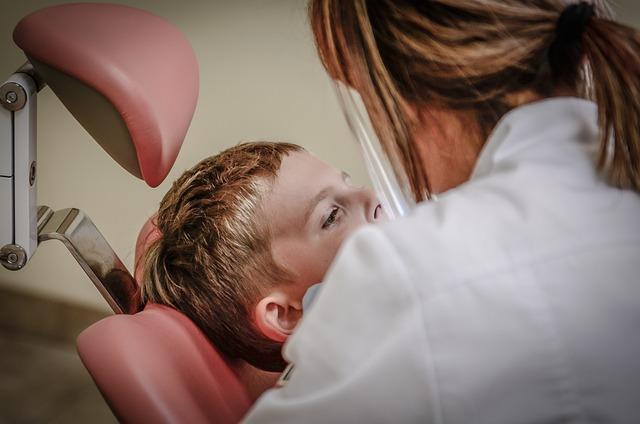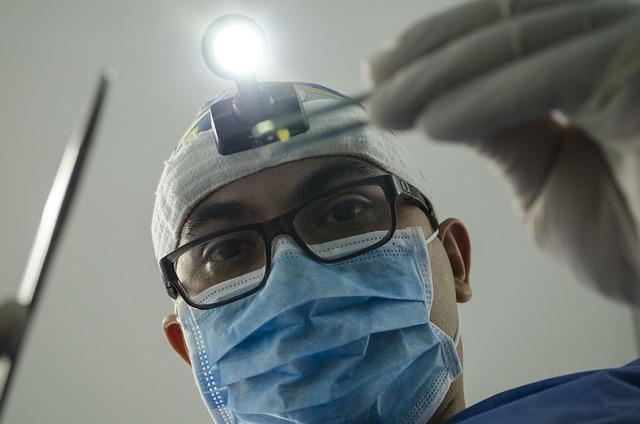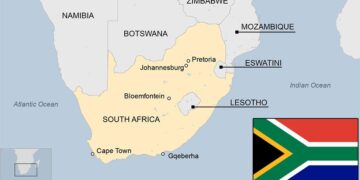In south Africa, a nation grappling with one of the highest rates of HIV infection in the world, the recent freeze on U.S. aid has sent shockwaves through vital healthcare systems reliant on foreign support.Clinics that provide essential anti-retroviral treatments and preventive measures are now facing turmoil as funding uncertainties jeopardize their operations. This article examines the implications of the aid suspension, exploring how it affects the delivery of critical health services, the challenges faced by local organizations, and the potential repercussions for the millions of South Africans who depend on these initiatives for their livelihoods and well-being. As the situation unfolds, questions arise about the reliability of international partnerships in addressing public health crises and the long-term sustainability of efforts to combat HIV/AIDS in the region.
Challenges Facing South Africa’s HIV clinics Amid US Aid Freeze

The recent freeze on U.S. aid has thrown South Africa’s HIV clinics into a state of uncertainty, challenging their ability to provide life-saving treatments and support to those living with the virus. Many clinics, which rely heavily on funding from the U.S. President’s Emergency Plan for AIDS Relief (PEPFAR), are now grappling with operational disruptions. Clinics face:
- Medication Shortages: the halt in funds threatens the steady supply of antiretroviral therapies.
- Staff Layoffs: Reduced financial support may lead to cuts in essential workforce, increasing the burden on remaining staff.
- Patient Services Withdrawal: Vital programs, including counseling and education, are at risk as resources dwindle.
in a country with one of the highest rates of HIV globally, this aid freeze has not only operational implications but also societal consequences. Community health workers, who play a critical role in reaching marginalized groups, are facing potential retrenchments, which could widen the treatment gap even further. Clinics are now assessing alternative funding sources and collaborating with local businesses.Key challenges include:
- Mobilizing Local support: Finding community-based solutions to fill the funding void.
- Adapting to New realities: rethinking strategies to ensure continuity of care despite financial constraints.
- Maintaining Patient Trust: Keeping patients informed and engaged is crucial during these turbulent times.
Impact of US Funding Cut on HIV Patient Care and Treatment Access

The recent decision to cut funding from the United States has sent shockwaves through HIV clinics in South Africa, complicating their efforts to provide crucial care and treatment to patients. As the largest source of international financing for HIV/AIDS programs in the region,this aid freeze poses notable challenges to ongoing efforts aimed at combating the epidemic. With dwindling resources, clinics are facing difficult decisions about how to allocate limited funds, which may result in decreased access to life-saving medications and essential healthcare services for those living with HIV.
Patients who previously relied on these clinics for regular check-ups and antiretroviral therapy now find themselves in a precarious situation. The funding cut is highly likely to lead to a number of critical issues, including:
- Increased wait times for treatment: Reduced staff and resources may result in longer waits for patients seeking care.
- Disruption in medication supply: Clinics may struggle to maintain adequate stocks of antiretroviral drugs.
- Limited outreach and education programs: Efforts to raise awareness and promote safe practices could be scaled back, jeopardizing prevention initiatives.
Moreover,the impact of these funding cuts extends beyond immediate patient care,possibly affecting broader public health objectives. As treatment access diminishes, the risk of HIV transmission increases, threatening to reverse years of progress made in the fight against the epidemic. Local health authorities will need to seek alternative funding sources and partnerships to sustain essential services and mitigate the consequences of these financial challenges.
Responses from Health Officials and NGOs in the Fight Against HIV

Health officials and NGOs are expressing deep concern over the recent freeze on U.S. aid, which has been a cornerstone of South Africa’s relentless fight against HIV. Many agencies warn that this withdrawal jeopardizes crucial services,including testing,treatment,and education programs that serve millions. Prominent health organizations have articulated their stance through various mediums,highlighting the risks posed by reduced funding:
- Impact on Treatment Access: Clinics report potential delays in the provision of antiretroviral therapy to patients.
- Increased Stigma: Diminished outreach efforts may exacerbate stigma surrounding HIV, preventing individuals from seeking help.
- Resource Strain: Local health systems, already stretched thin, could collapse under increasing demand without external support.
Moreover, several NGOs are advocating for immediate dialog with U.S. legislators to reverse the funding freeze. They emphasize the importance of U.S. aid in sustaining the comprehensive care network that has been built over the years. In an effort to consolidate responses, a recent table detailing funding allocation by various NGOs has been shared, highlighting how critical each dollar is in maintaining essential services:
| NGO Name | Annual Funding (USD) | Key Services Provided |
|---|---|---|
| UNAIDS | $10 million | Awareness & Testing Programs |
| MSF | $8 million | Medical Treatment & Counseling |
| TAC | $5 million | Advocacy & Education |
Long-term Consequences for South Africa’s Health Infrastructure

The recent freeze on U.S. aid has triggered a crucial crisis in South Africa’s health infrastructure, notably affecting clinics that provide essential services for HIV treatment and care. With a significant portion of these facilities relying on foreign funding, the halt puts at risk a range of critical health initiatives. The long-term implications are vast and multifaceted, including:
- Increased Mortality Rates: Disruptions in HIV treatment could lead to higher rates of complications and mortality among patients.
- healthcare Workforce Strain: A reduced operational budget may force clinics to downsize, resulting in staff layoffs and increased workloads for remaining healthcare professionals.
- Worsened Public Health Outcomes: A lack of resources can lead to deteriorating conditions for preventative health measures and treatment adherence.
- Ripple Effect on Related services: Closely tied services,such as maternal and child health programs,may also suffer from funding shortages.
Moreover, the withdrawal of support can create a crisis of confidence among healthcare providers and patients alike.Trust could erode as clinics struggle to deliver consistent care, potentially leading to a decline in patient enrollment and follow-up. The implications may also extend to broader socio-economic factors, as healthcare plays a vital role in a country’s economic stability and workforce productivity. As a notable example, a recent analysis highlighted the correlation between health infrastructure and economic performance, suggesting that:
| indicator | Impact |
|---|---|
| Infection Rates | Expected Increase |
| Workforce Productivity | Projected Decline |
| Healthcare Access | limited Availability |
Recommendations for Addressing Funding Gaps and Ensuring Care Continuity

To combat the current funding shortfalls affecting HIV clinics across south Africa, it is essential to implement a multifaceted approach that involves both government and community action. Diversifying funding sources can serve as a buffer against fluctuating international aid. This can be achieved through:
- Engaging private sector partnerships to create enduring funding models.
- Promoting local fundraising initiatives that involve communities directly.
- Exploring grants from international NGOs that align with HIV prevention efforts.
In addition to seeking new funding avenues, establishing collaborative networks among healthcare providers can enhance care continuity. By fostering dialogue across clinics, as well as between governmental and non-governmental organizations, it becomes possible to share resources and best practices. Key efforts should include:
- Regular information-sharing meetings to align services and resources effectively.
- Creating a centralized database for tracking patient care and managing transitions seamlessly.
- Developing comprehensive training programs for healthcare workers to ensure consistent service delivery even when resources are strained.
Prospects for Future US Aid and Strengthening Global Health Partnerships

The recent freeze on US aid has raised significant concerns about the future of public health initiatives in South Africa,particularly those aimed at combating HIV. Many clinics, which have relied heavily on american funding, are now scrambling to secure alternative sources of financial support.As discussions about potential changes in US aid continue,it is crucial for both local and global stakeholders to understand the implications of these shifts. The financial uncertainty could severely impact treatment accessibility and the sustainability of healthcare programs in the region, putting millions of lives at risk.
To face these challenges head-on, stakeholders must explore avenues for strengthening global health partnerships and diversify funding sources. This could include fostering collaborations between governments, non-profits, and private sectors. Key components to consider are:
- Innovative financing mechanisms: Engaging private investors or social impact bonds could help fill funding gaps.
- Cooperative international frameworks: Enhanced cooperation with global health organizations can leverage existing resources effectively.
- Local capacity building: empowering South African healthcare systems to implement community-focused programs can improve resilience.
By prioritizing these strategies, South African health initiatives can better whether potential future aid fluctuations and ensure continued support for vulnerable populations fighting HIV. This collective effort requires a commitment to adaptability and innovation within global health partnerships, ensuring that the needs of those affected are met consistently.
Key Takeaways
the ongoing struggle faced by HIV clinics in South Africa amid the U.S. aid freeze underscores the precarious balance between international support and local healthcare needs. As these facilities grapple with diminished resources and increased patient demands, the implications extend beyond immediate healthcare services to the broader public health landscape. The potential disruption of critical HIV treatment programs may lead to heightened vulnerabilities for affected populations, putting the hard-won progress in combating the epidemic at risk. Stakeholders must navigate this complex scenario with urgency and foresight, advocating for sustainable solutions and fostering partnerships that prioritize the health and well-being of communities. As the situation evolves, it remains imperative to closely monitor the developments surrounding this aid freeze and its impact on both the clinics and the lives they serve.















